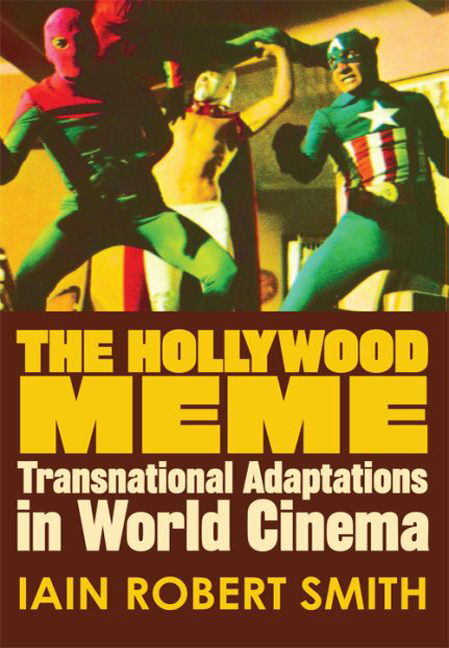Book contents
- Frontmatter
- Contents
- List of Figures
- Acknowledgements
- Introduction
- 1 Tracing the Hollywood Meme: Towards a Comparative Model of Transnational Adaptation
- 2 Hollywood and the Popular Cinema of Turkey
- 3 Hollywood and the Popular Cinema of the Philippines
- 4 Hollywood and the Popular Cinema of India
- Conclusion: Reflections on the Hollywood Meme
- Bibliography
- Index
4 - Hollywood and the Popular Cinema of India
Published online by Cambridge University Press: 26 April 2017
- Frontmatter
- Contents
- List of Figures
- Acknowledgements
- Introduction
- 1 Tracing the Hollywood Meme: Towards a Comparative Model of Transnational Adaptation
- 2 Hollywood and the Popular Cinema of Turkey
- 3 Hollywood and the Popular Cinema of the Philippines
- 4 Hollywood and the Popular Cinema of India
- Conclusion: Reflections on the Hollywood Meme
- Bibliography
- Index
Summary
The West may have the biggest stalls in the world's media bazaar, but it is not the only player. Globalisation isn't merely another word for Americanisation – and the recent expansion of the Indian entertainment industry proves it. For hundreds of millions of fans around the world, it is Bollywood – India's film industry – not Hollywood, that spins their screen fantasies.
Carla Power and Sudip Mazumdar (2000)The present-day Indian commercial film is the end result of a lengthy process of imitation, adaptation, and indigenisation. Confronted with challenges from abroad, Indian society has often responded by indigenising invasive foreign cultural elements and creating a new synthesis that is fundamentally Indian.
Mira Reym Binford (1988: 78)Tracing Hollywood in India – one of the few remaining places in the world where it plays as a secondary cinema – presents challenges and opportunities for comparative media research. Many of the characterizations that substantiate global Hollywood … cannot be uniformly applied in the Indian context.
Nitin Govil (2015: 188)In my previous chapters, I dealt with boom periods in transnational adaptations of Hollywood in Turkish cinema from 1970 to 1982, and Philippine cinema from 1978 to 1994. In this chapter, I continue the temporal trajectory taking us to the twenty-first century in my study of Indian commercial cinema from 1998 to 2010. As with the historical and spatial conjunctions that I dealt with in the previous chapters, this is a period in Indian cinema with a heightened level of adaptations from Hollywood, and this has much to tell us about the nature of what I have termed ‘the Hollywood meme’. These include such diverse reworkings as Ghulam (1998) / On the Waterfront (1954), Chachi 420 (1998) / Mrs Doubtfire (1993), Sangharsh (1999) / Silence of the Lambs (1991), Kahin Pyar Na Ho Jaaye (2000) / The Wedding Singer (1998), Chori Chori Chupke Chupke (2001) / Pretty Woman (1990), Mere Yaar Ki Shaadi Hai (2002) / My Best Friend's Wedding (1997), Humraaz (2002) / Dial M for Murder (1954), Qayamat (2003) / The Rock (1996), Main Aisa Hi Hoon (2005) / I am Sam (2001), Black (2005) / Miracle Worker (1962) and God Tussi Great Ho (2008) / Bruce Almighty (2003).
- Type
- Chapter
- Information
- The Hollywood MemeTransnational Adaptations in World Cinema, pp. 102 - 142Publisher: Edinburgh University PressPrint publication year: 2017



